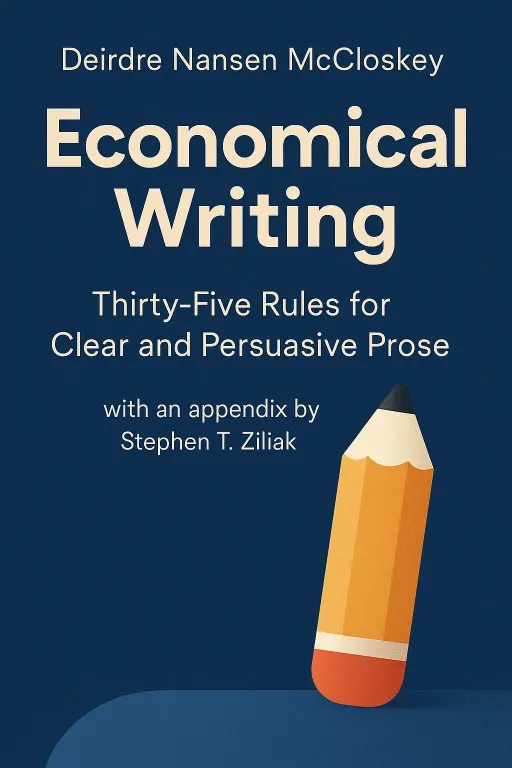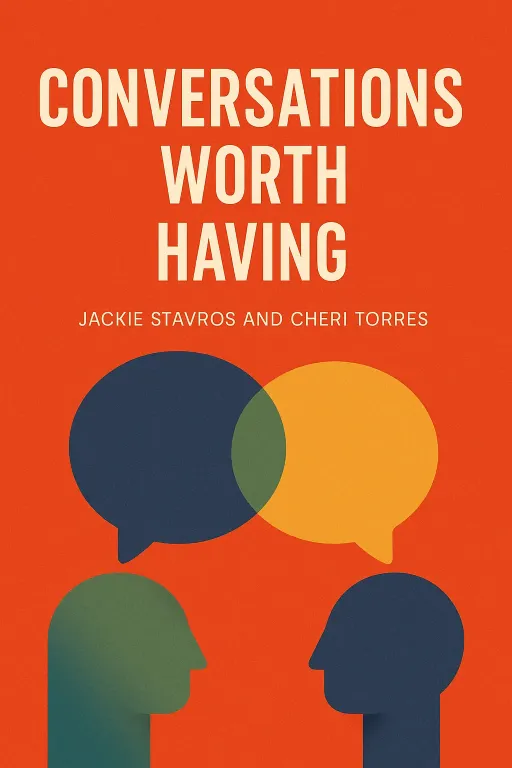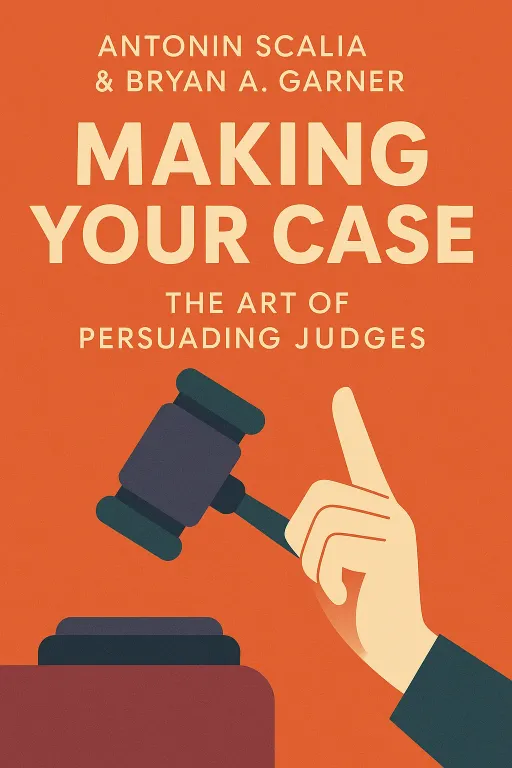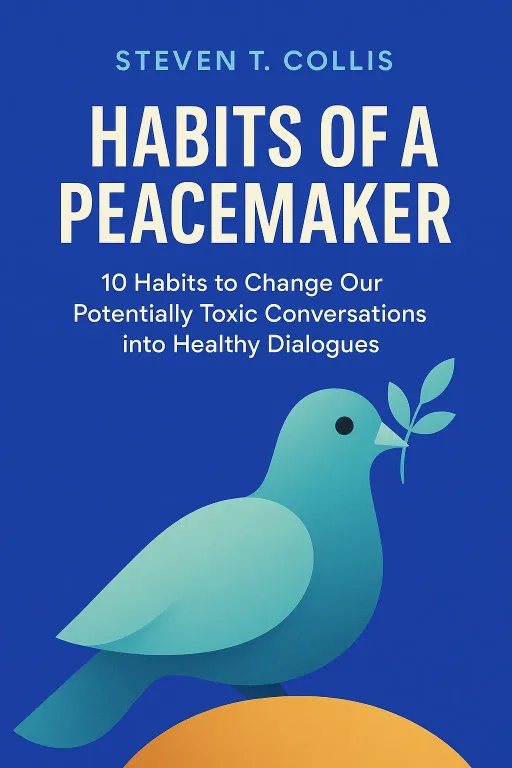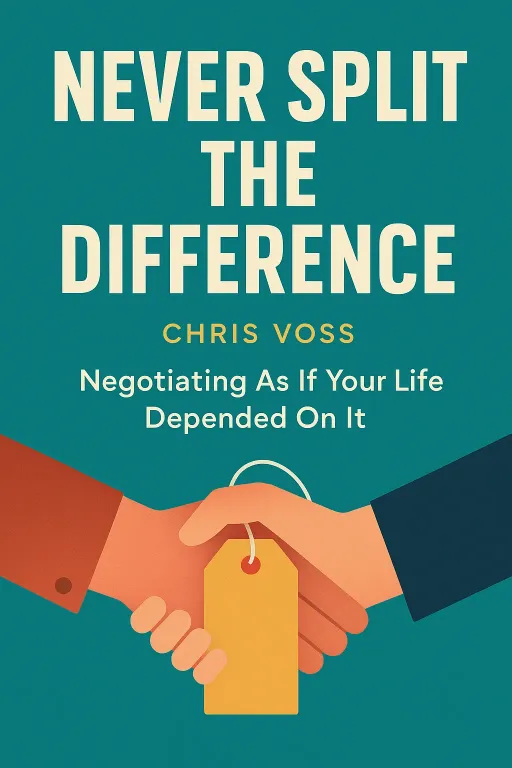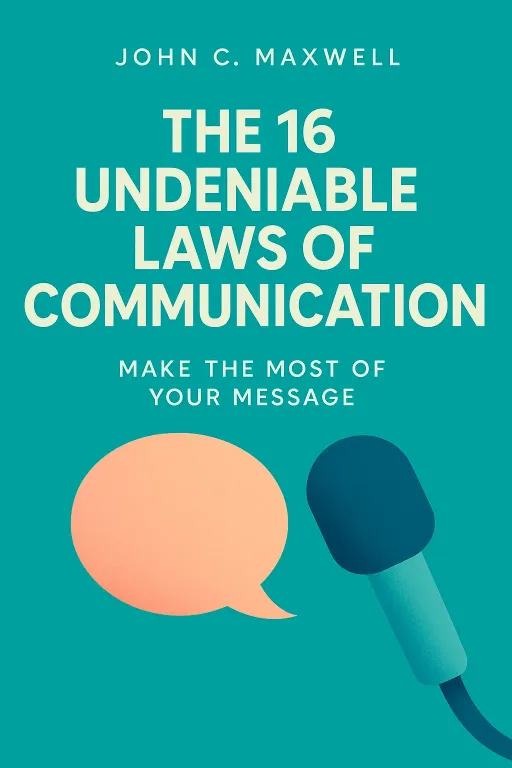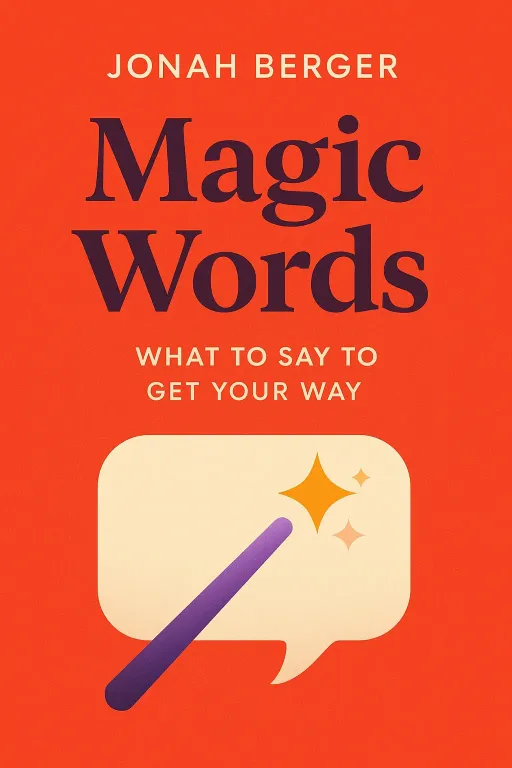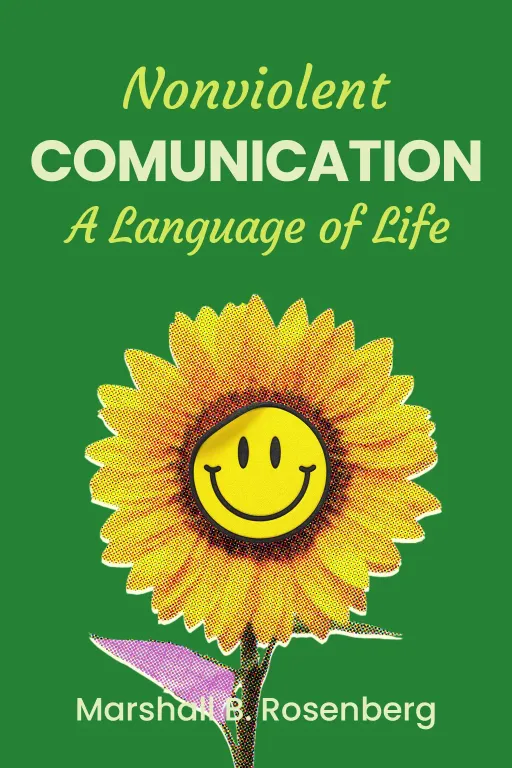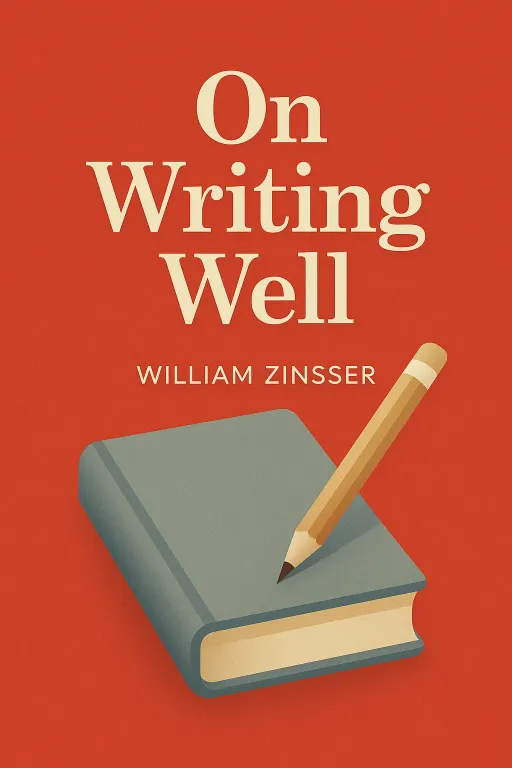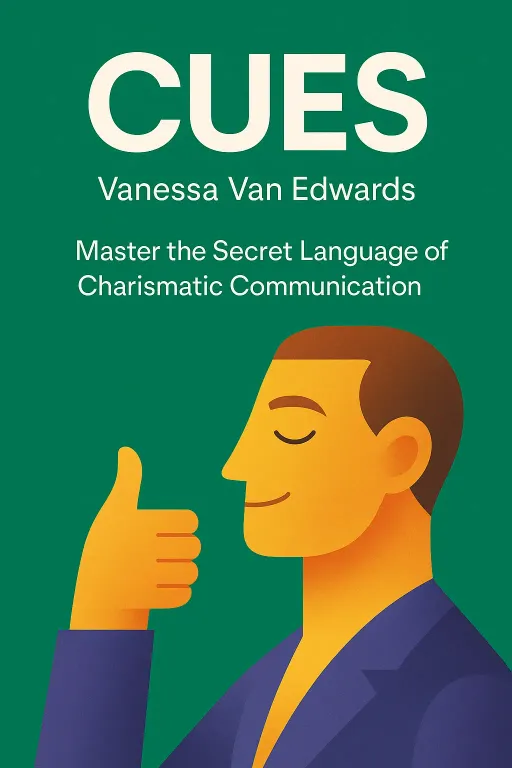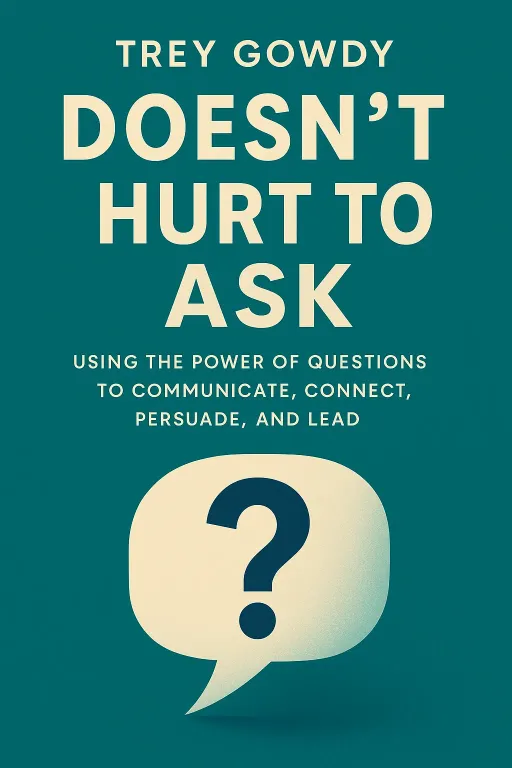
Speak Less, Persuade More
10 minGolden Hook & Introduction
SECTION
Michelle: The most persuasive people you know probably don't make many statements. They ask questions. It’s a total inversion of how we think about influence, where the person with the least to say often holds the most power. Mark: That is completely backwards from what I'd expect. I always picture a great persuader as someone giving a powerful, thundering speech, laying out all the facts. Not someone quietly asking questions. Michelle: Exactly. And that very inversion is the heart of the book we're diving into today: Doesn’t Hurt to Ask by Trey Gowdy. Mark: Oh, I know that name. Congressman, cable news host. I wouldn't have pegged him for an author on communication theory. Michelle: Well, and that's what makes this book so fascinating. Gowdy's background is absolutely key here. Before he was a well-known congressman, he was a high-stakes federal prosecutor. He says he wrote this book because he found more genuine persuasion in a courtroom with a jury than he ever did in the halls of Congress, where, as he puts it, everyone's mind is already made up. Mark: Wow. So he’s arguing that a courtroom, a place we see as adversarial, is actually better at creating agreement than the place that’s supposed to be about debate and compromise? Michelle: That’s the core argument. He believes the principles of justice—fairness, evidence, and especially questioning—are the most effective tools for uncovering truth, not just in a trial, but in any conversation. Mark: I’m intrigued. So where does this conviction come from? This idea that questions are everything?
The Power of Advocacy: Persuasion as a Moral Imperative
SECTION
Michelle: It was forged in the fire of the courtroom, in cases where everything was on the line. And there’s one story in the book’s introduction that just stops you in your tracks. It’s the last case he ever tried as a prosecutor. Mark: Okay, I’m listening. Michelle: Just a few weeks before he was set to be sworn into Congress, he was handed the case of Meah Weidner. Meah was a ten-year-old girl with cerebral palsy. She was non-verbal and confined to a wheelchair. She was beaten and shaken to death by her mother's boyfriend. Mark: Oh, that's just devastating. Michelle: It’s horrific. And the boyfriend’s story was that it was all a tragic accident. He was a firefighter, an EMT, with no criminal record. He claimed Meah had a seizure, fell out of her wheelchair, and that he might have accidentally harmed her while performing CPR. It was a story designed to create reasonable doubt. Mark: A classic "he said, she said" situation, except one of the people can't speak. How do you even begin to fight that lie? Michelle: That’s the exact challenge Gowdy faced. He was about to leave for a new life in Washington D.C., but he felt he couldn't. He writes, and this quote is just so powerful, "For the little girl who could no longer talk, I would talk. For the girl who couldn’t defend herself, I would defend her." He felt a moral duty to take the case. Mark: So this wasn't just another case file for him. It was personal. Michelle: Deeply. He knew he couldn't win by just shouting that the boyfriend was a liar. He had to use questions to slowly, methodically dismantle the story in front of the jury. He didn't just present autopsy photos. He asked the medical examiner questions that guided the jury to see the truth for themselves. Questions like, "Doctor, are these injuries consistent with a fall from a three-foot-high wheelchair?" "Are the bruises on her arms consistent with someone performing life-saving CPR, or are they more consistent with being gripped and shaken violently?" Mark: He’s making the jury connect the dots themselves. He’s not telling them the conclusion; he’s leading them to it. Michelle: Precisely. He’s building a bridge of logic, piece by piece, with each question. He’s letting the jury arrive at the truth on their own, which is infinitely more powerful. He paced in front of them, using his questions to, in his words, "assign the same value to her life that they would to their own children." Mark: And did it work? Michelle: It did. The jury found the boyfriend guilty of murder. The judge sentenced him to life in prison without parole. For Gowdy, this case became the ultimate symbol of what persuasion is really about. Mark: It’s not about winning an argument or being clever. It’s about advocacy. It's about standing up for a truth that needs a voice. Michelle: Yes. It’s a moral imperative. The book received a lot of praise for these real-life stories, and it became a number one bestseller, I think because it reframes persuasion. It’s not a selfish tool for getting your way. At its best, it's a profound act of service. Mark: That completely changes how I think about it. But, I have to say, that's a life-or-death courtroom scenario. It's incredibly powerful, but it feels so far removed from my life. How does this art of questioning work when you're not a prosecutor trying to put a murderer behind bars? Does it apply to, you know, trying to convince your spouse about a vacation spot or your boss about a new project?
The Art of the Question: Guiding vs. Telling
SECTION
Michelle: That is the perfect question, and it's exactly where Gowdy takes us next. He shows that the very same principle works in the most mundane, everyday situations. And he uses an example from his own life that is the complete opposite of the Meah Weidner case. Mark: Okay, I need to hear this. From a murder trial to what? Michelle: To a quiet conversation on a beach house porch. It was the summer after he graduated from college. He had a history degree, no job, no direction. He was planning to just work in construction. He was with his best friend's family, and one morning, his friend's mother, a woman named Mrs. Cox, asked him to stay behind while everyone else went to the beach. Mark: Uh oh. I feel a "what are you doing with your life" talk coming on. The kind everyone dreads. Michelle: And that’s what you’d expect! You’d expect a lecture. "Trey, you're too smart for construction. You need to go to law school. You should do this, you should do that." But Mrs. Cox did none of that. She just started asking him questions. Mark: What kind of questions? Michelle: Simple, gentle, non-leading questions. She asked, "What do you want to do with your life?" He said he didn't know. She asked, "Well, what are you good at?" He said he was good at arguing. She just listened. She let him talk. She didn't judge. She just kept asking these open-ended questions that forced him to reflect on his own skills and desires. Mark: So she never once said the words "law school"? Michelle: Never. She guided him to think about it himself. After he had talked himself in circles, she saw her opening. She didn't give him advice. Instead, she appealed to his pride and potential. She said, and this is the line that changed his life, "Surprise the skeptics, Trey, and do something amazing in life. Just know it will not surprise me because I’ve seen it in you since you were a child. It will be our secret. Just go surprise everyone else!" Mark: Wow. That gives me chills. She didn't tell him what to do. She told him who he was, and then let him figure out the rest. Michelle: It's transformative persuasion. He walked away from that conversation and, for the first time, seriously considered law school. He realized she had helped him persuade himself. It wasn't her idea imposed on him; it was his own potential, revealed to him through her questions. Mark: What's the magic there, though? It sounds so simple, but it's obviously a real art. What makes her questions different from just, you know, nagging someone with questions? Michelle: I think there are a few key things. First, she had a clear objective: she wanted to help him see a better path. Second, she knew her audience. She knew Trey was proud and probably wouldn't respond well to a direct order. Third, and most importantly, she listened. Her questions weren't an interrogation; they were an invitation for him to think out loud. She created a safe space for him to be vulnerable and honest. Mark: It’s the difference between a question that demands an answer and a question that opens a door. Michelle: That’s a perfect way to put it. And it connects directly back to the courtroom. A prosecutor asks a witness questions to lead a jury to a conclusion. Mrs. Cox asked a young man questions to lead him to his own future. The scale is different, but the mechanism is identical. You are guiding, not telling. You are helping them see a truth they couldn't see on their own. Mark: And it’s safer! If Mrs. Cox had said, "You should be a lawyer," he could have just said "No" and the conversation would be over. But by asking questions, she kept the dialogue going and made him do the heavy lifting. Michelle: Exactly. A statement can be rejected. A question has to be considered. That's the fundamental power Gowdy is trying to teach.
Synthesis & Takeaways
SECTION
Michelle: So when you put those two stories side-by-side—the gut-wrenching trial of a murdered child and the quiet, life-altering chat on a porch—you see the universal principle. Mark: Right. Whether it's a jury that needs to see the truth about a crime, or a young man who needs to see the truth about himself, the tool is the same. You don't force-feed them a conclusion. Michelle: You create the conditions for them to discover it themselves. You build a bridge with questions and invite them to walk across it. Persuasion isn't a battle to be won; it's a truth to be revealed. And the most effective way to reveal it is to let the other person find it. Mark: So the next time I want to persuade someone, my first step isn't to build my argument and gather my five killer points. It's to stop and think about what questions I can ask. What do they believe? What do they care about? And how can I ask something that makes them think, instead of just telling them what I think? Michelle: That is the entire philosophy of the book in a nutshell. It’s a shift from broadcasting to receiving. It’s about being more of a curious listener than a brilliant orator. Mark: It’s a lot harder, but it sounds a lot more effective. And honestly, a lot more respectful to the other person. Michelle: It is. And maybe that’s the final insight. The book has been praised and criticized, with some readers finding its blend of memoir and self-help a bit unusual, but the core idea is undeniably powerful. True, lasting persuasion is built on a foundation of respect for the other person's autonomy. You're not changing their mind; you're creating a space where they can choose to change it themselves. Mark: I love that. It really does feel like a more hopeful way to communicate, especially in a world where everyone is just shouting their opinions. Michelle: So, a final thought for our listeners. Think about the last time you changed your mind about something important. Were you argued into it, or were you asked a question that you just couldn't stop thinking about? Mark: This is Aibrary, signing off.
